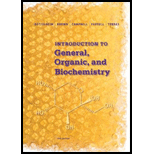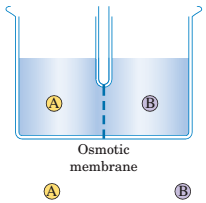
Introduction to General, Organic and Biochemistry
11th Edition
ISBN: 9781285869759
Author: Frederick A. Bettelheim, William H. Brown, Mary K. Campbell, Shawn O. Farrell, Omar Torres
Publisher: Cengage Learning
expand_more
expand_more
format_list_bulleted
Concept explainers
Textbook Question
Chapter 6, Problem 6.73P
6-73 In each case, tell which side (if either) rises and why. The solvent is water.

(a) 1% glucose
glucose
(b) 0.1 M glucose
5 M glucose
(c) 1M NaCI
1 M glucose
(d) 1 M NaCI
1 M K2SO4
(e) 3% NaCI
KCI
(f) 1 M NaBr
1 M KCI
Expert Solution & Answer
Want to see the full answer?
Check out a sample textbook solution
Students have asked these similar questions
Please correct answer and don't used hand raiting
9. The following reaction, which proceeds via the SN1/E1 mechanisms, gives three alkene products (A, B,
C) as well as an ether (D). (a) Show how each product arises mechanistically. (b) For the alkenes,
determine the major product and justify your answer. (c) What clues in the reaction as shown suggest
that this reaction does not go by the SN2/E2 mechanism route?
(CH3)2CH-CH-CH3 CH3OH
1
Bl
CH3OH ⑧· (CH3)2 CH-CH=CH2
heat
H
⑥③ (CH3)2 C = C = CH3
© СнЗ-С-Снаснз
сна
(CH 3 ) 2 C H G H CH 3
оснз
Please Don't used hand raiting
Chapter 6 Solutions
Introduction to General, Organic and Biochemistry
Ch. 6.5 - Problem 6-1 How would we prepare 250 mL of a 4.4%...Ch. 6.5 - Prob. 6.2PCh. 6.5 - Problem 6-3 How would we prepare 2.0 L of a 1.06 M...Ch. 6.5 - Prob. 6.4PCh. 6.5 - Problem 6-5 If a 0.300 M glucose solution is...Ch. 6.5 - Problem 6-6 A certain wine contains 0.010 M NaHSO3...Ch. 6.5 - Prob. 6.7PCh. 6.5 - Problem 6-8 A concentrated solution of 15% w/v KOH...Ch. 6.5 - Problem 6-9 Sodium hydrogen sulfate, NaHSO4, which...Ch. 6.8 - Prob. 6.10P
Ch. 6.8 - Prob. 6.11PCh. 6.8 - Prob. 6.12PCh. 6.8 - Problem 6-13 What is the osmolarity of a 3.3% w/v...Ch. 6.8 - Prob. 6.14PCh. 6 - 6-15 Answer true or false. (a) A solute is the...Ch. 6 - 6-16 Answer true or false. (a) Solubility is a...Ch. 6 - 6-17 Vinegar is a homogeneous aqueous solution...Ch. 6 - 6-18 Suppose you prepare a solution by dissolving...Ch. 6 - 6-19 In each of the following, tell whether the...Ch. 6 - 6-20 Give a familiar example of solutions of each...Ch. 6 - 6-21 Are mixtures of gases true solutions or...Ch. 6 - 6-22 Answer true or false. (a) Water is a good...Ch. 6 - 6-23 We dissolved 0.32 g of aspartic acid in 115.0...Ch. 6 - Prob. 6.24PCh. 6 - 6-25 A small amount of solid is added to a...Ch. 6 - 6-26 On the basis of polarity and hydrogen...Ch. 6 - Prob. 6.27PCh. 6 - 6-28 Which pairs of liquids are likely to be...Ch. 6 - Prob. 6.29PCh. 6 - 6-30 Near a power plant, warm water is discharged...Ch. 6 - 6-31 If a bottle of beer is allowed to stand for...Ch. 6 - 6-32 Would you expect the solubility of ammonia...Ch. 6 - Prob. 6.33PCh. 6 - Prob. 6.34PCh. 6 - 6-35 Describe how we would prepare the following...Ch. 6 - Prob. 6.36PCh. 6 - 6-37 Calculate the w/v percentage of each of these...Ch. 6 - 6-38 Describe how we would prepare 250 mL of 0.10...Ch. 6 - 6-39 Assuming that the appropriate volumetric...Ch. 6 - 6-40 What is the molarity of each solution? (a) 47...Ch. 6 - 6-41 A teardrop with a volume of 0.5 mL contains...Ch. 6 - Prob. 6.42PCh. 6 - 6-43 The label on a sparkling cider says it...Ch. 6 - Prob. 6.44PCh. 6 - 6-45 The label on ajar of jam says it contains 13...Ch. 6 - 6-46 A particular toothpaste contains 0.17 g NaF...Ch. 6 - 6-47 A student has a bottle labeled 0.750% albumin...Ch. 6 - 6-48 How many grams of solute are present in each...Ch. 6 - 6-49 A student has a stock solution of 30.0% w/v...Ch. 6 - Prob. 6.50PCh. 6 - Prob. 6.51PCh. 6 - Prob. 6.52PCh. 6 - 6-53 Dioxin is considered to be poisonous in...Ch. 6 - 6-54 An industrial wastewater contains 3.60 ppb...Ch. 6 - 6-55 According to the label on a piece of cheese,...Ch. 6 - Prob. 6.56PCh. 6 - Prob. 6.57PCh. 6 - Prob. 6.58PCh. 6 - Prob. 6.59PCh. 6 - 6-60 Predict which of these covalent compounds is...Ch. 6 - Prob. 6.61PCh. 6 - Prob. 6.62PCh. 6 - Prob. 6.63PCh. 6 - Prob. 6.64PCh. 6 - Prob. 6.65PCh. 6 - 6-66 What gives nanotubes their unique optical and...Ch. 6 - 6-67 Calculate the freezing points of solutions...Ch. 6 - 6-68 If we add 175 g of ethylene glycol, C2H6O2,...Ch. 6 - Prob. 6.69PCh. 6 - 6-70 In winter, after a snowstorm, salt (NaCI) is...Ch. 6 - 6-71 A 4 M acetic acid (CH3COOH) solution lowers...Ch. 6 - Prob. 6.72PCh. 6 - 6-73 In each case, tell which side (if either)...Ch. 6 - 6-74 An osmotic semipermeable membrane that allows...Ch. 6 - 6-75 Calculate the osmolarity of each of the...Ch. 6 - Prob. 6.76PCh. 6 - Prob. 6.77PCh. 6 - 6-78 (Chemical Connections 6A) Oxides of nitrogen...Ch. 6 - Prob. 6.79PCh. 6 - Prob. 6.80PCh. 6 - Prob. 6.81PCh. 6 - 6-82 (Chemical Connections 6C) A solution contains...Ch. 6 - 6-83 (Chemical Connections 6C) The concentration...Ch. 6 - 6-84 (Chemical Connections 6D) What is the...Ch. 6 - Prob. 6.85PCh. 6 - Prob. 6.86PCh. 6 - Prob. 6.87PCh. 6 - Prob. 6.88PCh. 6 - Prob. 6.89PCh. 6 - Prob. 6.90PCh. 6 - 6-91 When a cucumber is put into a saline solution...Ch. 6 - Prob. 6.92PCh. 6 - 6-93 Two bottles of water are carbonated, with CO2...Ch. 6 - Prob. 6.94PCh. 6 - Prob. 6.95PCh. 6 - 6-96 We know that a 0.89% saline (NaCI) solution...Ch. 6 - Prob. 6.97PCh. 6 - Prob. 6.98PCh. 6 - 6-99 A concentrated nitric acid solution contains...Ch. 6 - 6-100 Which will have greater osmotic pressure?...Ch. 6 - Prob. 6.101PCh. 6 - Prob. 6.102PCh. 6 - 6-103 A swimming pool containing 20,000. L of...Ch. 6 - Prob. 6.104PCh. 6 - Prob. 6.105PCh. 6 - Prob. 6.106PCh. 6 - Prob. 6.107PCh. 6 - Prob. 6.108PCh. 6 - Prob. 6.109PCh. 6 - Prob. 6.110PCh. 6 - 6-111 As noted in Section 6-8C, the amount of...Ch. 6 - 6-112 List the following aqueous solutions in...Ch. 6 - 6-113 List the following aqueous solutions in...
Knowledge Booster
Learn more about
Need a deep-dive on the concept behind this application? Look no further. Learn more about this topic, chemistry and related others by exploring similar questions and additional content below.Similar questions
- 7. For the following structure: ← Draw structure as is - NO BI H H Fisher projections (a) Assign R/S configuration at all chiral centers (show all work). Label the chiral centers with an asterisk (*). (b) Draw an enantiomer and diastereomer of the above structure and assign R/S configuration at all chiral centers (again, show all work). (c) On the basis of the R/S system, justify your designation of the structures as being enantiomeric or diastereomeric to the original structure.arrow_forwardDon't used Ai solutionarrow_forward1. For the following reactions, predict the major product. Show stereochemistry where appropriate. неу b) 7 HBr XV ROOR H₂504 c) N/ H20 H+2 d) ~ Pt c) f. MCPBA -> сна сла (solvent) (1)BH 3-THE (3) Надрон B177 H20 9)arrow_forward
- For the following reactions, predict the major product. Show stereochemistry where approarrow_forwardHow is Talu home quer in Org. Chemistry propose a 3-butanal prepared from ketone? complete reaction for this, (to start from the guignand Meagent. ②what pocubble products could be produced from the reaction of : CA₂ CH₂ CH₂ dil H.504 A CH3 1 OBCH₂OH Naz Cr₂ 07 12504 NazCD 4 CH3CH2 07 AzS04 H3C H3C CH3-C - C - Atz но но + H, CH3 07 > ⑦Colts C614501 + (215) 504 кон 4arrow_forwardRank the following compounds most to least acidic: a) О OH 요애 OH .OH flow flow О F F F F OH F b) Ha EN-Ha CI Ha F F CI Haarrow_forward
- a) b) Provide arrows to show the mechanisms and then predict the products of the following acid base reaction. Use pKas to determine which way the reaction will favor (Hint: the lower pka acid will want to dissociate) Дон OH Ha OH NH2 c) H H-O-Harrow_forwardMATERIALS. Differentiate between interstitial position and reticular position.arrow_forwardFor each of the following, indicate whether the arrow pushes are valid. Do we break any rules via the arrows? If not, indicate what is incorrect. Hint: Draw the product of the arrow and see if you still have a valid structure. a. b. N OH C. H N + H d. e. f. مه N COHarrow_forward
- Decide which is the most acidic proton (H) in the following compounds. Which one can be removed most easily? a) Ha Нь b) Ha Нь c) CI CI Cl Ha Ньarrow_forwardProvide all of the possible resonanse structures for the following compounds. Indicate which is the major contributor when applicable. Show your arrow pushing. a) H+ O: b) c) : N :O : : 0 d) e) Оarrow_forwardDraw e arrows between the following resonance structures: a) b) : 0: :0: c) :0: N t : 0: بار Narrow_forward
arrow_back_ios
SEE MORE QUESTIONS
arrow_forward_ios
Recommended textbooks for you
 Introduction to General, Organic and BiochemistryChemistryISBN:9781285869759Author:Frederick A. Bettelheim, William H. Brown, Mary K. Campbell, Shawn O. Farrell, Omar TorresPublisher:Cengage Learning
Introduction to General, Organic and BiochemistryChemistryISBN:9781285869759Author:Frederick A. Bettelheim, William H. Brown, Mary K. Campbell, Shawn O. Farrell, Omar TorresPublisher:Cengage Learning General, Organic, and Biological ChemistryChemistryISBN:9781285853918Author:H. Stephen StokerPublisher:Cengage Learning
General, Organic, and Biological ChemistryChemistryISBN:9781285853918Author:H. Stephen StokerPublisher:Cengage Learning Chemistry & Chemical ReactivityChemistryISBN:9781337399074Author:John C. Kotz, Paul M. Treichel, John Townsend, David TreichelPublisher:Cengage Learning
Chemistry & Chemical ReactivityChemistryISBN:9781337399074Author:John C. Kotz, Paul M. Treichel, John Townsend, David TreichelPublisher:Cengage Learning

Introduction to General, Organic and Biochemistry
Chemistry
ISBN:9781285869759
Author:Frederick A. Bettelheim, William H. Brown, Mary K. Campbell, Shawn O. Farrell, Omar Torres
Publisher:Cengage Learning

General, Organic, and Biological Chemistry
Chemistry
ISBN:9781285853918
Author:H. Stephen Stoker
Publisher:Cengage Learning

Chemistry & Chemical Reactivity
Chemistry
ISBN:9781337399074
Author:John C. Kotz, Paul M. Treichel, John Townsend, David Treichel
Publisher:Cengage Learning
Solutions: Crash Course Chemistry #27; Author: Crash Course;https://www.youtube.com/watch?v=9h2f1Bjr0p4;License: Standard YouTube License, CC-BY